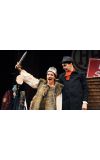
25 Apr 2012 01:10:32
The poll covered more than 300 complaints received over the last five years at 98 library authorities in the UK about "unsuitable, inappropriate or offensive" books. Half the complaints were about children's books, with the 1930s classic Babar's Travels by Jean de Brunhoff removed from shelves in East Sussex after protests that it contained racist stereotypes of black Africans, and Hergé's Tintin in the Congo taken out of libraries in Lewisham for similar reasons following protests.
Mr Benn author David McKee drew the most criticism over his books Tusk Tusk, called "racist" by parents, Two Monsters, which contains "aggressive" insults such as "stupid peabrain", "twit", "dumbo" and "ignoramus", according to complaints, and Denver, which was accused of "supporting wealth inequality".
Not all complaints resulted in removal from library shelves, although each is followed up with an investigation by library staff. Ian Clark, a library campaigner at Voices for the Library, said withdrawals were "very much a rare thing".
"No professional librarian would withdraw a book due to a complaint unless it was under exceptional circumstances. Books may get temporarily withdrawn whilst policies are consulted, but it is exceptionally rare for permanent withdrawal. In the case of most books, they will be returned to the shelves in reasonable time," he said.
Horrible Histories title Rotten Rulers was attacked for "glorifying and trivialising violence", according to the Sunday Telegraph's survey, while science spin-off Painful Poisons drew complaints for encouraging dangerous experiments. Francesca Simon's popular children's book Horrid Henry contains "blasphemy", according to one parent, who complained to library staff in Derbyshire over the hero's use of the phrase "oh my God". The book was kept on shelves, however.
Classic stories including Ali Baba and the Forty Thieves and The Nutcracker were "too scary and sinister" for children, according to some parents who complained about their presence on library shelves, while Dahl's story books Revolting Rhymes and Even More Revolting Rhymes were attacked for their "coarse language". In Dahl's version of Little Red Riding Hood, the heroine takes a decidedly Dahl-ian approach to offing the wolf. "The small girl smiles. One eyelid flickers. / She whips a pistol from her knickers. / She aims it at the creature's head, / And bang bang bang, she shoots him dead."
Adult books did not escape attempts at censorship either, the Sunday Telegraph reported, with complaints received over books by Philip Larkin and Michael Palin for their "offensive language". Louise Mensch, the Conservative MP who writes chick lit novels as Louise Bagshawe and who is now sitting on the select committee into library closures, was also criticised for her language, according to the survey.
Children's author and library campaigner Alan Gibbons said he had once received a complaint from the father of a child about a "satanic" book he read to year two: Meg and Mog. "I refused to agree not to read books with witches and said that if he had to, he had the right to send his child to another class while I peddled satanism in infant story time. He didn't take up the offer," said Gibbons.
While Gibbons said he was against censorship, he admitted that there was a "real issue" with the "colonial representations" of Africans in some books. "Tintin in the Congo is one notorious example and it makes for very uncomfortable reading for a modern audience. I know of a number of libraries which, while not withdrawing the book, do put a note in it saying some readers may feel upset by negative images that belong to another era when racist stereotypes were common. Other books such as David McKee's Tusk Tusk have caused controversy with allegations of racism when the author was quite clearly trying to combat racism," said Gibbons. "However much people might like it to be true in the best of all possible worlds, works of literature, even children's books, are not value-free and will continue to stir up lively passions."
Clark expressed the concern that the growing tendency of councils to hand libraries over to volunteers would make the issue worse. "Community libraries will make withdrawal of books (or censorship) more common as the staff, unlike librarians, are not bound by professional ethics," he said. "Furthermore, as the staff are drawn from the community, it is likely that more pressure will be exerted upon staff to withdraw books. Consequently, the issue of censorship and banned books are very strong arguments for a professionally run service. If community libraries are to spread, it is very likely that stories of censorship and withdrawn books will increase."
Desmond Clarke, library campaigner and former Faber director, agreed. "We should not be concerned that people complain but that sensible professional judgement is always applied," he said. "Removing professional librarians from libraries risks allowing local prejudices to determine book selection."

